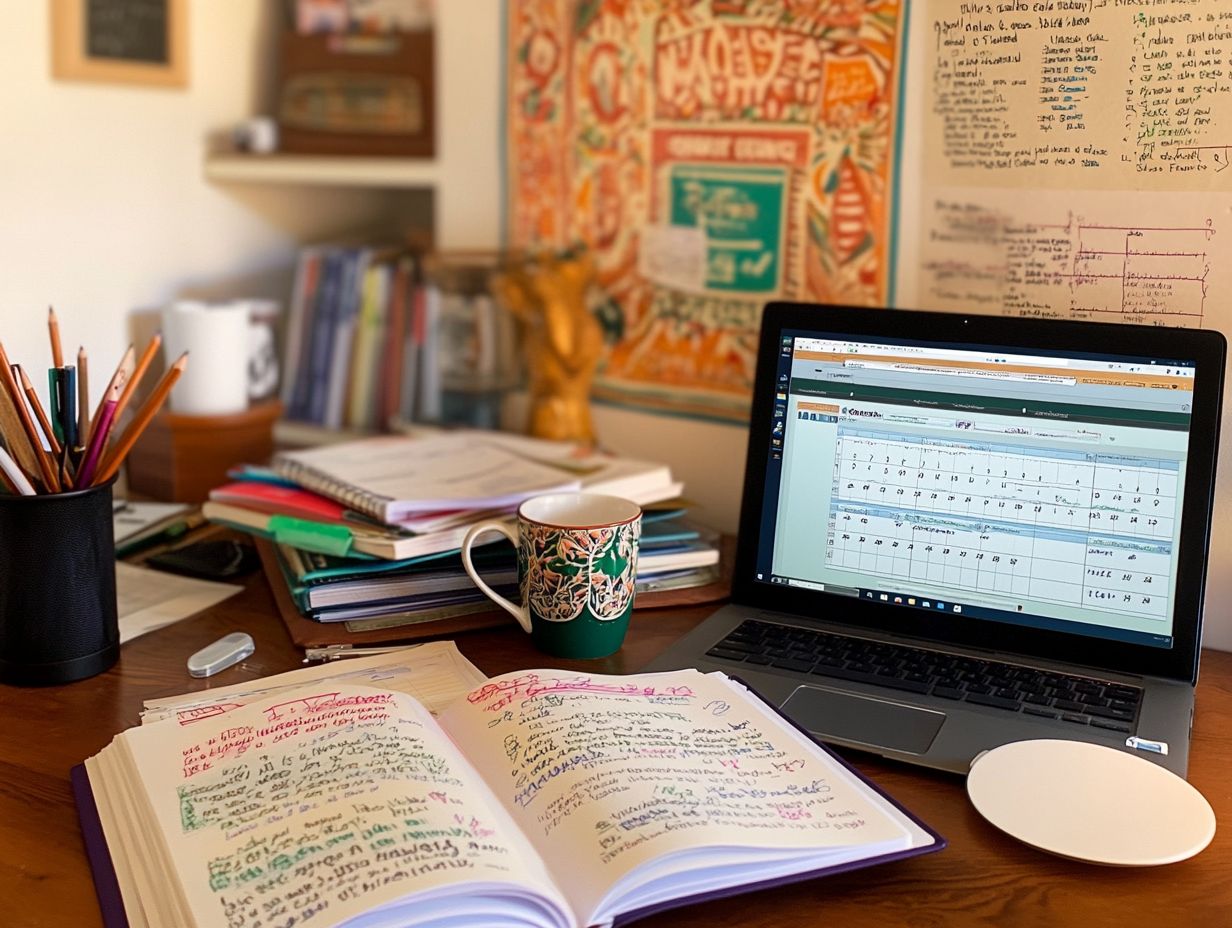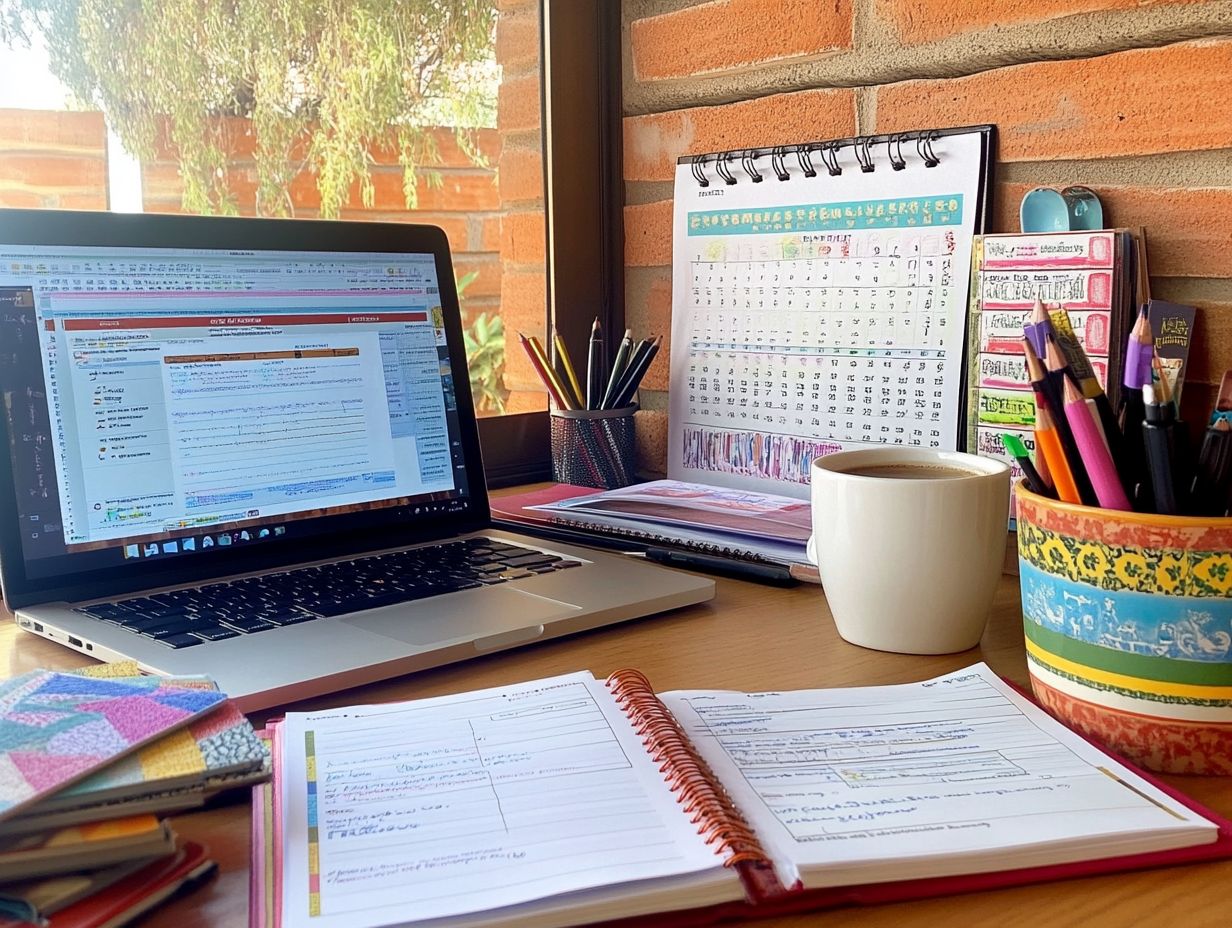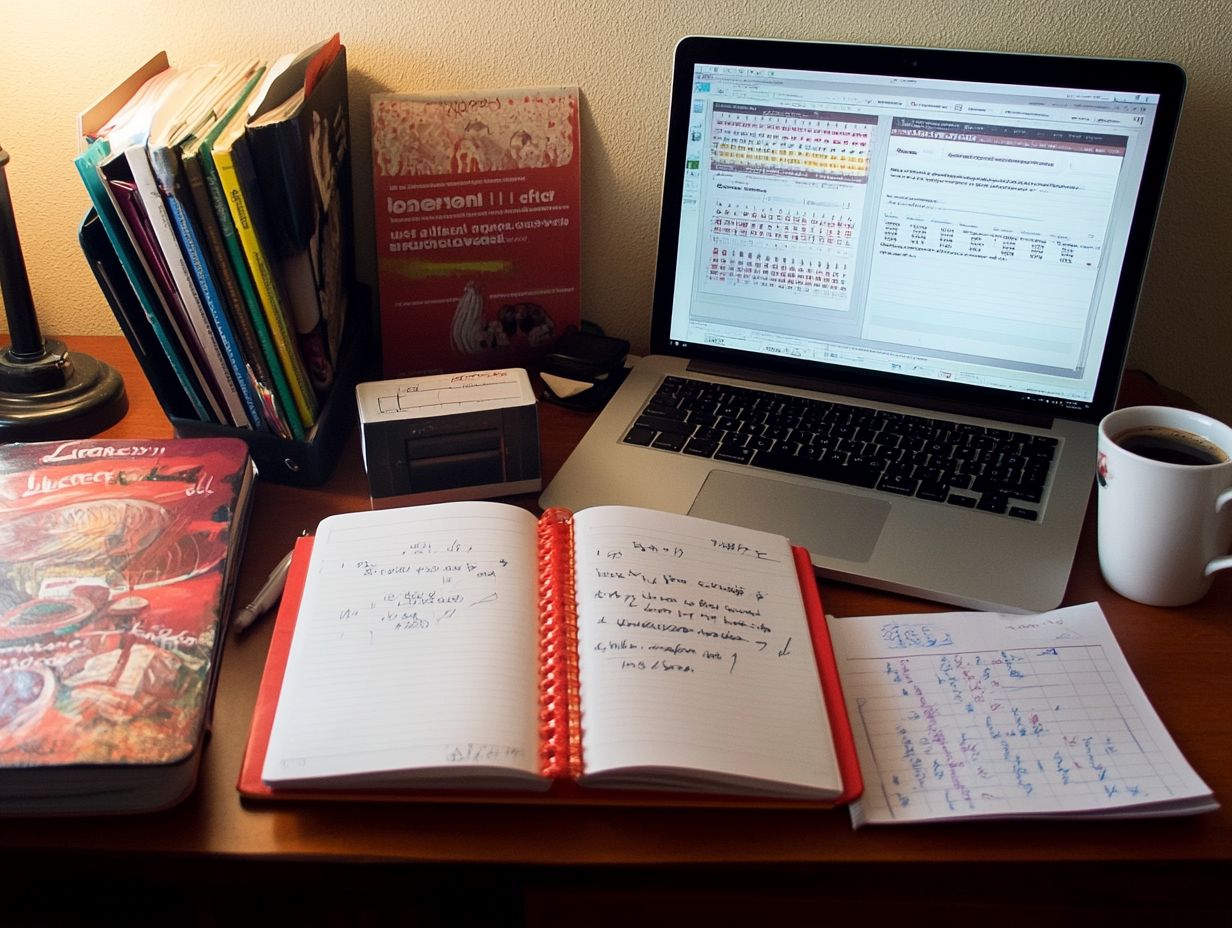tips for success on ap spanish language exam
Preparing for the AP Spanish Language Exam might seem daunting, but with the right strategies in your arsenal, you can pave the way for success. Get ready to discover effective study tips that will boost your confidence!
This guide will walk you through effective study tips, offer insights into the exam format, and provide techniques to maximize your scores in both the multiple-choice and free-response sections.
You’ll find essential advice for the day before and the day of the exam, ensuring that you are fully prepared when the moment arrives. Dive in and equip yourself with the tools necessary for an outstanding performance!
Contents
- Key Takeaways:
- What to Expect and How to Prepare
- Study Tips for Success
- Understanding the Exam Format
- Maximizing Your Score on the Multiple-Choice Section
- Mastering the Free-Response Section
- Tips for Exam Day
- Frequently Asked Questions
- What is the AP Spanish exam and why is it important?
- What are some general tips for success on the AP Spanish exam?
- How should I prepare for the listening section of the AP Spanish exam?
- What can I do to improve my reading comprehension for the AP Spanish exam?
- How can I best prepare for the writing section of the AP Spanish exam?
- Are there any specific test-taking strategies I should keep in mind for the AP Spanish Language exam?
Key Takeaways:
- Focus on effective study techniques.
- Understand the exam format and question types.
- Practice writing strong essays and presentations.

What to Expect and How to Prepare
Preparing for the AP Spanish Language and Culture Exam requires understanding the exam format and developing effective strategies. Focus on the core components to build the skills necessary for success.
This preparation involves immersing yourself in authentic Spanish-language materials think music, television, films, and literature. This not only enriches your cultural understanding but also enhances your ability to communicate effectively.
Use online practice tests and record speaking exercises. These will serve as valuable tools in your exam preparation arsenal.
Study Tips for Success
To succeed in AP Spanish, use effective study techniques. Consistent practice is key, along with strategic exam preparation that aligns with the exam’s format and content.
Implement structured study schedules and utilize diverse resources such as tutoring sessions with a native speaker or online practice tools. This will build both confidence and competency in all aspects of the language and its culture.
Furthermore, refine your essay writing skills and develop effective exam strategies. These will significantly enhance your conversational skills and presentation abilities.
Effective Study Techniques and Resources
Using effective study techniques and diverse resources is essential for mastering the AP Spanish Language and Culture curriculum. Engaging with Spanish-language music, television, movies, and literature not only elevates your language comprehension but also enriches your cultural understanding, turning your study sessions into enjoyable experiences.
Recording your speaking practice and participating in language exchanges can sharpen your conversational skills.
For example, listening to Shakira can improve your listening skills while teaching you idiomatic expressions. Watching iconic telenovelas like Yo soy Betty, la fea offers a fascinating glimpse into everyday social interactions. Diving into literary masterpieces such as Don Quijote expands your vocabulary and deepens your cultural context.
To further elevate your language acquisition, consider these strategies:
- Maintain a Spanish-language diary to document your thoughts and reflections.
- Engage in regular conversations with a Spanish-speaking friend to practice your spoken skills in authentic scenarios.
Understanding the Exam Format

Understanding the AP Spanish Language and Culture Exam format is crucial. It assesses your skills in interpreting, conversing, and presenting in Spanish.
By familiarizing yourself with the structure, types of questions, and timing, you can adopt a focused study approach. This will enhance your preparedness and boost your confidence come exam day.
Sections and Question Types
The AP Spanish Language and Culture Examination consists of multiple sections that assess your communication skills through various question types, including multiple-choice and free-response formats.
This exam is carefully designed to evaluate your interpretive communication abilities. You’ll engage in tasks such as listening activities, where you listen to audio clips and answer questions that gauge your comprehension of spoken Spanish.
In the reading comprehension section, you’ll analyze written texts, focusing on themes, tone, and nuance. Expect questions that challenge you to draw inferences and support your answers with evidence from those texts.
Your presentational communication will be assessed through writing prompts that ask you to craft essays on cultural or thematic topics. This provides an opportunity to express your ideas clearly and coherently.
Oral tasks require you to respond to prompts conversationally, emphasizing your fluency and proficiency. Master these skills, and you’ll navigate real-world conversations in Spanish-speaking environments with confidence!
Maximizing Your Score on the Multiple-Choice Section
Maximizing your score on the multiple-choice section of the AP Spanish Language and Culture Examination demands effective strategies, diligent preparation, and a deep understanding of the various question types.
By focusing on essential exam strategies like time management, reading comprehension, and contextual understanding, you can approach the multiple-choice questions confidently and precisely.
Engaging with practice tests is invaluable, allowing you to familiarize yourself with the exam format while sharpening your skills for optimal performance.
Strategies for Answering Multiple-Choice Questions
Developing effective strategies for answering multiple-choice questions is essential for your success on the AP Spanish Language and Culture Examination. Analyze the question stem, pay attention to details, and eliminate unlikely choices these tactics will enhance your performance.
Practicing with sample questions and review materials increases your familiarity with the exam format, ultimately improving your ability to respond accurately. Identify keywords within the questions; they often hold vital clues to the correct answers.
Utilizing context clues in the text can guide your decision-making and allow for intelligent guessing when necessary. Time management is key; allocate specific periods for each section to avoid feeling rushed.
Regular practice tests are invaluable, as they acclimate you to the exam’s rhythm and boost your confidence as you witness your improvement over time. Diversifying your resources from online quizzes to study groups will build a comprehensive understanding that prepares you for success!
Mastering the Free-Response Section

Mastering the free-response section of the AP Spanish Language and Culture Examination is crucial for showcasing your writing and speaking skills, as well as your ability to articulate complex ideas in Spanish.
In this section, you will encounter tasks designed to evaluate your presentational communication skills through written essays and recorded responses. This demands a strategic approach to achieve clarity and depth.
By familiarizing yourself with the expectations of each task and honing your writing and speaking abilities, you will undoubtedly enhance your performance. Start preparing now to ensure your success!
Tips for Writing Strong Essays and Presentations
Writing strong essays and delivering effective presentations in the free-response section of AP Spanish requires a blend of organization, clarity, and cultural insight.
To excel, focus on crafting clear arguments supported by relevant evidence, using different words, and showcasing a strong command of the Spanish language. Practicing your presentations and sharing personal experiences can enrich your content and boost engagement.
Integrating personal reflections and cultural context elevates your discussions and strengthens your connection with the audience. Techniques like storytelling and using pictures or diagrams can enhance clarity and expressiveness, making your points not just heard but felt.
Being aware of the diversity within Spanish-speaking cultures fosters richer, more inclusive dialogue that respects various perspectives. Regular feedback from peers improves your skills and encourages continuous development in both writing and presentation abilities.
Tips for Exam Day
As the day of the AP Spanish Language and Culture Examination approaches, effective strategies and mental preparation can significantly impact your performance.
Thoughtful preparation includes revisiting key concepts, ensuring you have all essential materials, and maintaining a calm, focused mindset. Take time to relax and visualize your success to boost your confidence and readiness for the challenges ahead.
What to Do the Day Before and Day of the Exam
The day before and the day of the AP Spanish Language and Culture Examination are crucial for final preparation and mental readiness. Avoid cramming new material.
Instead, review familiar content, practice relaxation techniques, and ensure you get proper rest; these elements can enhance your focus and performance. On exam day, approach the test with confidence, equipped with effective strategies and a positive mindset.
To optimize performance, set aside an hour for a light review, focusing on vocabulary and common themes rather than new grammar rules.
Engage in relaxation methods like deep breathing or light yoga to ease pre-exam stress. Prepare necessary materials pens, pencils, and a water bottle to avoid last-minute scrambling.
On exam day, maintain a stable morning routine; a balanced breakfast fuels your energy, while positive affirmations can boost your confidence. Arriving at the exam venue early allows for a smooth and calm transition into the testing environment.
Frequently Asked Questions

What is the AP Spanish exam and why is it important?
The AP Spanish exam is an advanced placement exam that tests students’ proficiency in Spanish. A passing score can earn college credit and demonstrate language abilities to potential colleges and employers.
What are some general tips for success on the AP Spanish exam?
General tips for success include practicing speaking and writing in Spanish, immersing yourself in the language and culture, and familiarizing yourself with the exam format and content.
How should I prepare for the listening section of the AP Spanish exam?
To prepare for the listening section, listen to various Spanish audio materials, such as podcasts, music, and news broadcasts. Practice listening for specific details and taking notes in Spanish.
What can I do to improve my reading comprehension for the AP Spanish exam?
To improve reading comprehension, read Spanish texts regularly, including books, news articles, or online content. Practice summarizing and analyzing the main ideas and key details of the text.
How can I best prepare for the writing section of the AP Spanish exam?
To prepare for the writing section, practice writing in Spanish regularly and familiarize yourself with different types of writing, such as essays, letters, and summaries. Focus on grammar, vocabulary, and sentence structure.
Start practicing today to set yourself up for success!
Are there any specific test-taking strategies I should keep in mind for the AP Spanish Language exam?
Yes! Pace yourself during the exam and understand each question before moving on. Carefully read and follow all instructions.
Use your time wisely to check your work and make necessary edits. Make sure to explore the practice materials from the College Board to boost your confidence!






